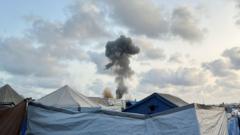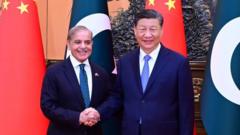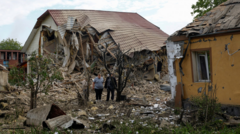As the conflict intensifies, Israel finds itself in increasingly deep waters with growing international dissent, particularly from longtime allies like the UK, France, and Canada.
**Global Pressure Mounts on Israel as Allies Demand Ceasefire in Gaza Offensive**

**Global Pressure Mounts on Israel as Allies Demand Ceasefire in Gaza Offensive**
International condemnation grows as UK, France, and Canada call for an end to military operations in Gaza amid mounting humanitarian crisis.
In the wake of resuming its offensive against Gaza following the ceasefire collapse in March, Israel has faced severe criticism from the UK, France, and Canada regarding the humanitarian consequences of its actions. The three nations collectively denounced Israel's military operations and called for an immediate ceasefire, highlighting the "intolerable" human suffering in the region.
Israeli Prime Minister Benjamin Netanyahu's insistence that the war's continuation aims to dismantle Hamas and secure the return of hostages has not alleviated international concerns. Their statement reflects alarm over escalating civilian casualties amid Israeli airstrikes, which have reportedly led to the deaths of thousands, including numerous children.
Netanyahu's limited allowance of aid into Gaza has been deemed insufficient, with international leaders stressing the need for "safe, swift, and unimpeded access for humanitarian aid." The tide of criticism reached new heights after the killing of 15 paramedics during a military operation, crystallizing the outcry against Israel's tactics. The tragedy heightened the anger among European allies who now threaten further "concrete steps" if the situation does not improve, with potential sanctions or recognizing Palestine as a state on the table.
As world leaders like French President Macron express mounting frustration over Israel's military strategies, the tone of the collective condemnation underscores a significant shift in diplomatic relations, suggesting that Israel's previously unchallenged stance may be coming to an end, as humanitarian crises become a central focus in negotiations moving forward.
In the light of growing international outrage, Israel may find its diplomatic leverage waning as allies demand accountability. The potential for Palestinian state recognition looms as an avenue for diplomatic action against the ongoing military offensive, indicating that the current trajectory could lead to profound changes in regional politics and international relations surrounding the Israel-Palestine conflict.
Israeli Prime Minister Benjamin Netanyahu's insistence that the war's continuation aims to dismantle Hamas and secure the return of hostages has not alleviated international concerns. Their statement reflects alarm over escalating civilian casualties amid Israeli airstrikes, which have reportedly led to the deaths of thousands, including numerous children.
Netanyahu's limited allowance of aid into Gaza has been deemed insufficient, with international leaders stressing the need for "safe, swift, and unimpeded access for humanitarian aid." The tide of criticism reached new heights after the killing of 15 paramedics during a military operation, crystallizing the outcry against Israel's tactics. The tragedy heightened the anger among European allies who now threaten further "concrete steps" if the situation does not improve, with potential sanctions or recognizing Palestine as a state on the table.
As world leaders like French President Macron express mounting frustration over Israel's military strategies, the tone of the collective condemnation underscores a significant shift in diplomatic relations, suggesting that Israel's previously unchallenged stance may be coming to an end, as humanitarian crises become a central focus in negotiations moving forward.
In the light of growing international outrage, Israel may find its diplomatic leverage waning as allies demand accountability. The potential for Palestinian state recognition looms as an avenue for diplomatic action against the ongoing military offensive, indicating that the current trajectory could lead to profound changes in regional politics and international relations surrounding the Israel-Palestine conflict.





















